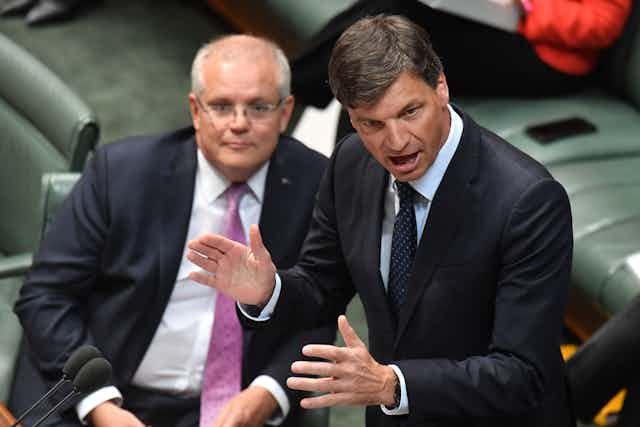Scott Morrison on Tuesday had a firm message for his troops in the Coalition party room. Don’t go freelancing in public.
Discipline is important in politics and Morrison is intent on trying to impose it – it’s not the first time since the election he’s made the point.
After he became PM in August the proximity of the poll put its own constraints on Coalition MPs (even if they were quite frequently breached). But now the rules have to be reset, and Morrison wants to whip the backbench into line early.
He told the party room everyone needed to be “mindful of what we took to the election and what we didn’t take”. Members shouldn’t run off on other matters, especially not publicly.
Backbenchers should use internal processes if they wanted to push issues - committees, approaches to ministers, the party room.
Going outside these processes was showing “disrespect to colleagues”, he said (a convenient high-minded pitch that probably carries little weight in the competitive environment of attention-seeking backbenchers clawing their way towards the front).
Morrison threw in a few examples where using these processes had led to positive results for advocates on issues, such as eating disorders and suicide.
Apparently he didn’t give instances of where people had been kicking over the traces.
He could have been thinking of Monday’s front page in The Australian where a number of Liberals MPs were urging the government to stop the legislated increase in the superannuation guarantee. One was Andrew Hastie, a prominent MP out to make a name for himself as a leader among the conservatives.
Then there were comments from Western Australian Liberal senator Dean Smith, who shot to prominence in the 2017 same-sex marriage debate. Smith told the Senate on Monday he thought Newstart should be increased. Liberals, he said, “should pay very, very close attention to the comments of former leader John Howard on this matter”.
Read more: Politics with Michelle Grattan: Centre Alliance's Stirling Griff on Newstart
Howard is on record favouring a rise. The government’s talking points, in sharp contrast, are full of arguments (mostly spurious) against an increase.
With his authority as high as it will ever be in the foreseeable future, it’s not surprising Morrison, a disciple of discipline and control, is laying down markers. The question is the extent to which they’ll be heeded.
There are some incorrigibles, such as Barnaby Joyce, the frustrated former Nationals leader who’s never likely to take any notice of Morrison.
Beyond that, the siren call of opportunity for self-promotion presented by voracious news channels can be strong for backbenchers, regardless of counselling against it.
And then there are issues that go to ideology. The degree to which Morrison can restrain backbenchers as the religious freedom debate heats up will be a significant test.
As he moves to corral his own team, Morrison’s tactic against Labor has been hyper-aggressive. The kill Bill strategy has morphed into axe Albo. A nod to bipartisanship gives way to demands this week, whatever the issue, for Labor to say “whose side they are on”.
This kicking the ALP when it’s down - despite the exhausted voters looking for less conflict - is partly driven by Morrison believing in the need to keep your foot on your opponent’s neck from the start. He told the Coalition party room not to underestimate Labor.
Read more: Bills, banks and promises: here's what you can expect as 'government business' starts again
There may have been a lot of talk about how Morrison is well set up for the next election, but he’s equally aware how quickly an opposition can come back.
At the moment the ALP can’t avoid looking rather discombobulated, with its policies in limbo and juggling what to support and what to oppose in parliament. It inevitably appears conflicted when it criticises legislation and then says it will back it, even though that might be the best course in the circumstances.
In caucus on Tuesday, Albanese called Morrison a “negative, nasty politician, where it’s all about tactics”.
But Albanese also highlighted his own tactics, on display in parliament on Tuesday, which have changed markedly from those of Bill Shorten. Pointed, short, no frills questions have contrasted with the more discursive, rhetorical approach under the former leader.
Energy minister Angus Taylor was the target, with questioning on rising emissions, nuclear power, and a controversy involving the clearing of endangered grasslands on a property in which he holds shares through his family investment company. Taylor, not a strong performer in the House, floundered.
It’s an effective question time approach, particularly where there are several fronts on which to attack a minister. Even when the questions are spread, the more specific they are, the greater the effort required from the government. Ministers will need to be better prepared. This is especially the case as Speaker Tony Smith is showing he is intent on being an enforcer of relevance.
Read more: The Morrison government's biggest economic problem? Climate change denial
The opposition’s sharper tactic has the potential to improve question time, and even extract some government accountability during it.
Having had to sit through the pummelling of his minister, Morrison said at the end, “I would invite the opposition to ask me a question tomorrow. You didn’t do that today. Maybe tomorrow”.
A remark that suggested a little concern about his soft ministerial targets.

